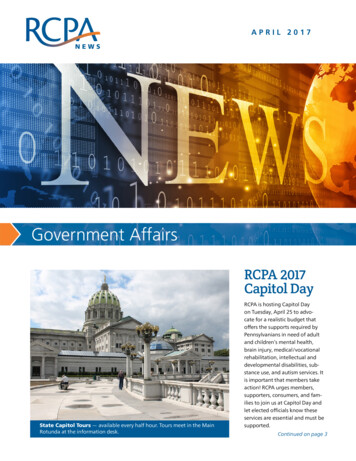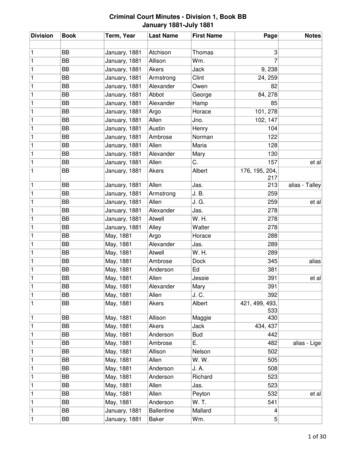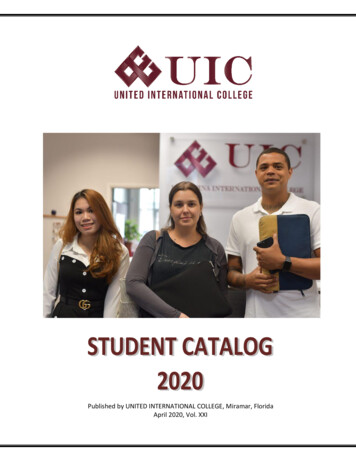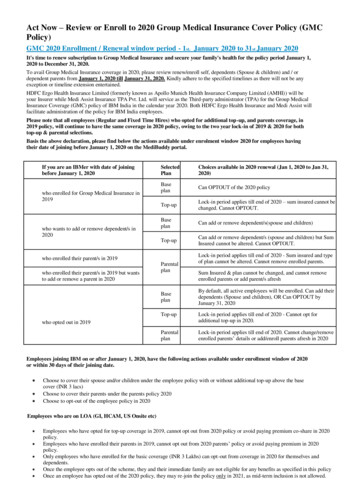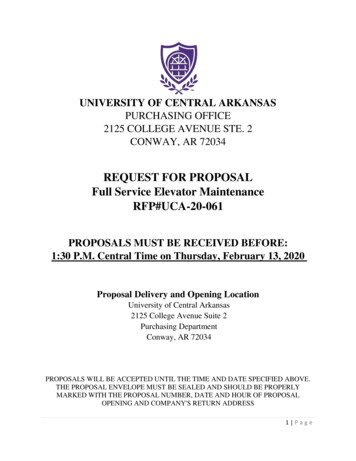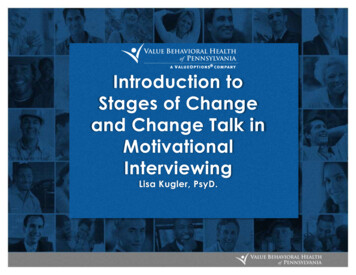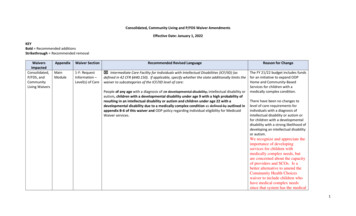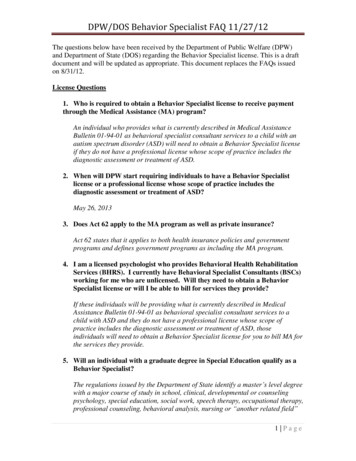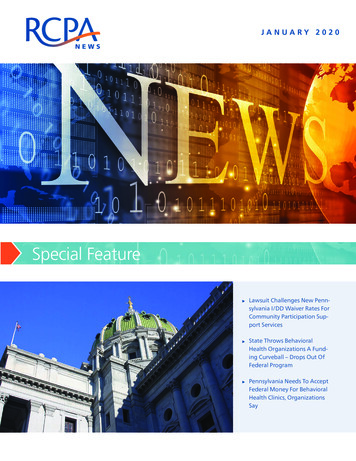
Transcription
JANUARY 2020NEWSSpecial FeatureE Lawsuit Challenges New Pennsylvania I/DD Waiver Rates ForCommunity Participation Support ServicesE State Throws BehavioralHealth Organizations A Funding Curveball – Drops Out OfFederal ProgramE Pennsylvania Needs To AcceptFederal Money For BehavioralHealth Clinics, OrganizationsSay
NEWSContentsJANUARY 2020Richard S. Edley, PhDPresident and CEOAllison BrogniaEvent Planner/Accounts Payable ManagerMelissa DehoffDirector, Rehabilitation ServicesDivisionsSarah Eyster, MSWDirector, Mental Health Division,Eastern Region RepresentativeCarol FerenzDirector, IDD DivisionCindi HobbesDirector, International PediatricRehabilitation CollaborativeKristen HouserDirector, Drug & Alcohol DivisionLinda KaufmannMembership/Conference AdministratorTieanna LloydAccounts Receivable/Membership Services ManagerTina MileticAssistant to the President/CEO,Finance ManagerSharon MilitelloDirector, CommunicationsJack Phillips, JDDirector, Government Affairs1347789101112131516Special FeatureMembershipGovernment AffairsFederal NewsState NewsMedical RehabilitationBrain InjuryPhysical Disabilities & AgingMental HealthDrug & AlcoholIDDChildren’s ServicesCalendarJim Sharp, MSDirector, Children’s DivisionRehabilitation and CommunityProviders Association777 E Park Dr, Ste 300Harrisburg, PA 17111-2754717-364-3280 — Phone717-364-3287 — Faxwww.paproviders.org 2020. This monthly newsletter is written by theRehabilitation and Community Providers Association (RCPA)for the health and human services communities. Deadline forpublication is the 20th of every month or the Friday before.The views and opinions expressed in these articles are thoseof the authors and do not necessarily reflect the officialpolicy or position of RCPA.
MembershipMembers in the NewsERCPA Member Colleen Stuart of Venango Training andDevelopment Center, Inc. Receives Junior Achievement NationalSilver Leadership Award (pictured is Colleen Stuart with Bill Lucas,Executive VP for Junior Achievement of Western PA)ERCPA Member Via of the Lehigh Valley CEO TransitionEAgency Veteran Takes The Reins At Leading Disability ServicesProvider: RCPA Member UCP Central PA Names Janeen LatinPresident/CEOELawmakers Eye Good Samaritan Law: RCPA member Paul Bacharachfrom Gateway Rehab, and RCPA Drug & Alcohol Division DirectorKristen Houser, weigh in on this legislation and its potential forunintended consequencesECanonization Sought for Disability Institute Founder – RCPAMember Barber National InstituteEEERCPA Board Member Dennis W. Nebel, PsyD,Executive Director, Human Services CenterRetiringDr. Dennis Nebel, longtime executive director of theHuman Services Center, has retired, effective December 31.NEW MEMBERSBUSINESSLinke Resources106 Brookhollow DrDowningtown, PA 19335George P. Linke, Jr, PsyD,Founder and PresidentAs the largest state association of itskind, RCPA continues to look for ways tostrengthen its voice. One way to facilitate thisis by the recruitment of new members. Fornew provider members, there is a discountfor the first year of membership. If you havequestions about membership or know ofan organization that would benefit frommembership with RCPA, please contactTieanna Lloyd, Accounts Receivable/Membership Services Manager.Former HSC Clinical Director, Michele Kelly-Thompson,has replaced him. Ms. Thompson has been employedat HSC since July 1, 1987, and will be well suited toserve as HSC’s Chief Executive of the future.Dr. Nebel, a licensed psychologist, began his full-timetenure at HSC in June 1979. A graduate of St. VincentCollege, St. Francis College and receiving his Doctoratefrom Baylor University, Dr. Nebel actually began part-time employment atHSC in the late Fall of 1978, conducting psychological evaluations whileconcurrently completing his Psychology Internship at the Pittsburgh ChildGuidance Center at the University of Pittsburgh Medical Center. Nebel,68 years of age, is originally from Aliquippa. He was first hired as a staffpsychologist in the Child and Family Services Department at HSC in June 1979following the completion of his internship. In 1982, Dr. Nebel was promotedto HSC Clinical Director and subsequently became HSC’s fifth executivedirector, since its founding in 1963, in June 1992 [read full article here]. FVisit the RCPA website for up-to-dateinformation on legislation, meetings,trainings, and other industrydevelopments. FR C PA N E W S A J A N U A R Y 2 0 2 03
Government AffairsHouse Health Committee Advances State Center Moratorium BillOn Tuesday, December 17, the House Health Committee voted Senate Bill 906 (SB 906) out of committee by a vote of13-12. Thirteen (13) of the fifteen (15) Republicans voted in favor of the bill and all ten (10) Democrats on the Committeevoted against the bill. SB 906 now heads to the full House for consideration.It is still unclear whether House leadership will allow a vote on the bill when the General Assembly returns to session afterthe holiday break. The earliest a final vote can be taken will be during the week of January 13.SB 906 would do the following:EProhibit the Department of Human Services (DHS) from closing a state facility until all Medicaid waiver-eligibleindividuals in the Commonwealth are authorized to begin receiving home and community-based services;ERequire DHS to provide notice in the Pennsylvania Bulletin when all individuals have received authorization tobegin home and community-based services;EEEstablish a task force regarding the closure of state centers upon publication of notice; andRequire the Secretary of DHS to convene an initial meeting of the task force within sixty (60) days. F2020 Spring House and SenateSession DaysThe House and Senate will be in session this spring asfollows:2020 SENATE SPRING SESSION SCHEDULEJanuary 7, 27, 28, 29February 3, 4, 5March 16, 17, 18, 23, 24, 25April 6, 7, 8May 4, 5, 6, 18, 19, 20June 1, 2, 3, 8, 9, 10, 15, 16, 17, 22, 23, 24, 25, 26, 29, 302020 HOUSE SESSION SCHEDULEJanuary 7 (non-voting), 13, 14, 15, 21, 22February 3, 4, 5March 16, 17, 18, 23, 24, 25April 6, 7, 8, 14, 15, 16May 4, 5, 6, 11, 12, 13, 18, 19, 20June 1, 2, 3, 8, 9, 10, 15, 16, 17, 22, 23, 24, 25, 26, 29, 304R C PA N E W S A J A N U A R Y 2 0 2 0Senate Announces 2020 StateBudget Hearing ScheduleThe State Senate has announced the state budgetschedule for fiscal year 2020/21. See the schedulehere. Please contact Jack Phillips, Director ofGovernment Affairs, with questions. F
Government AffairsObamacare Individual Mandate Ruled UnconstitutionalThe U.S. Court of Appeals for the Fifth Circuit ruled, in a 2–1decision in State of Texas v. U.S Department of Health andHuman Services, that the Affordable Care Act’s individualmandate is “unconstitutional because it can no longer beread as a tax, and there is no other constitutional provisionthat justifies this exercise of congressional power.” Thecourt remanded to the district court to provide additionalanalysis on the severability of the other ACA provisionsto determine how much of the rest of the health care lawis valid. Citing the Supreme Court ruling that originallydetermined that the individual mandate was constitutionalunder Congress’s power to tax, the Fifth Circuit determinedthat because the shared responsibility payment no longerexists – and no longer produced revenue – the individualmandate is now unconstitutional because it is now merelya “command” to purchase insurance – rather than givingthe individual an option to purchase insurance or pay a tax.While District Court Judge Reed O’Connor had ruled on theunconstitutionality of the individual mandate – and alsodetermined that the mandate was inseverable from therest of the health care law – the Fifth Circuit sent the caseback to Judge O’Connor with orders to conduct a morethorough analysis of which provisions of the ACA couldbe separated from the individual mandate because theoriginal severability analysis was not “careful” or “granular”enough.In her dissent, Judge Carolyn King argued that not onlydid the challengers not have legal standing to challengethe individual mandate, the individual mandate shouldbe found constitutional despite the elimination of thepenalty. Further, the mandate is also severable fromthe remainder of the ACA, King wrote, “Without anyenforcement mechanism to speak of, questions about thelegality of the individual ‘mandate’ are purely academic,and people can purchase insurance – or not – as theyplease. No more need be said; it has long been settledthat the federal courts deal in cases and controversies, notacademic curiosities.” (Source: Healthcare Daily Roundup,Buchanan, Ingersoll & Rooney, PC – Federal GovernmentAffairs Group, December 19, 2019) FPA Supreme Court Appears to Close the Door on Legal Challenge to theElimination of the State’s General Assistance Cash Welfare ProgramThe Pennsylvania Supreme Court on Wednesday, with a 6–1ruling, upheld a Commonwealth Court decision to rejectan injunction by welfare advocates who wanted to preventthe second termination of the state’s General Assistance(GA) cash welfare program while they legally challenged there-elimination of the program on procedural issues.“ we find that the Commonwealth Court did not abuseits discretion in determining that Appellants failed to carrytheir burden with regard to the likelihood-of-success-onthe-merits aspect of the standard for preliminary injunctiverelief,” wrote Chief Justice Tom Saylor in the majority opinion,joined by Justices Max Baer, Debra Todd, Christine Donohue,Kevin Dougherty, and Sallie Updyke Mundy. “That being thecase, we need not address whether the court erred in findingthat Appellants failed to demonstrate irreparable harm.”The General Assembly in June voted to discontinue theGeneral Assistance program and Gov. Tom Wolf reluctantlysigned the legislation (House Bill 33, now Act 12 of 2019),which critics of the program termination argue containedother components – including Medicaid money forPhiladelphia hospitals – that forced Wolf to sign the bill intolaw. Appellants claim that’s an example of unconstitutional“logrolling,” and have asked the courts to rule the legislationunconstitutional and force another resumption of theprogram.As they did in 2012 when the program was first eliminatedas part of that year’s state budget, Community LegalServices (CLS) of Philadelphia – along with Disability RightsPennsylvania (DRP) – filed a class action lawsuit in July inCommonwealth Court to prevent the ending of the program.At that time, with the cash payments to approximately12,000 low-income Pennsylvanians to end on Aug. 1, thelegal action included a request for a preliminary injunction toprevent the cessation of the benefits.The Commonwealth Court ultimately rejected thepreliminary injunction request – finding those challengingAct 12 failed to show the irreparable harm that wouldbe created by GA’s cessation, as well as their likelihood ofsuccess in the lawsuit – with that ruling appealed to the statecontinued on page 6R C PA N E W S A J A N U A R Y 2 0 2 05
Government Affairscontinued from page 5Supreme Court on Aug. 6, and oral arguments delivered tothe court in October.The first elimination of GA was ultimately overturned bythe state Supreme Court last year (in July), with the courtstating the way by which the legislation ending GA wasconsidered by the General Assembly didn’t comport withthe Pennsylvania Constitution’s requirement that legislationbe considered on three separate days in each chamber ofthe Legislature.This time around, CLS and DRP are claimingthe legislation that was enacted to end GA contains toomany separate and unrelated subjects, violating a differentprovision of the Pennsylvania Constitution (the “singlesubject” rule). Beyond the GA provisions, the law containslanguage reauthorizing a hospital assessment that is usedto fund Philadelphia hospitals and the state’s Medicaidprogram, as well as a nursing home incentive payment, allof which – like GA – exist within the state’s Human ServicesCode.The state Supreme Court, in its July 2018 ruling thatoverturned the omnibus 2012 Human Services Code bill,included a footnote discussion suggesting that legislationhad too many disparate subjects.But while opponents of the GA elimination have beenpointing to that as another potential avenue for a successfullegal challenge, the state’s high court appeared to close thedoor on that line of argument.Saylor wrote that Commonwealth Court “properlydetermined that Act 12 does not include provisions that areso far removed from each other that they are ‘unrelated’ orwould otherwise render the germaneness test meaningless.”“Rather, the act as a whole relates to the provision ofbenefits pertaining to the basic necessities of life to certainlow-income individuals,” continued Saylor. “Some of thesebenefits may be in the form of cash assistance for such itemsas basic utility services, food, clothing, and personal hygieneproducts, while others may be supplied through medicalor nursing-home care, the delivery of which is incentivizedby payments to providers. Regardless, such a topic is, in ourview, both unifying and sufficiently narrow to fit within thesingle-subject rubric as that concept has been spelled out inthe reported decisions of Pennsylvania appellate courts.”In his dissent, Justice David Wecht disagreed with themajority opinion’s determination that Commonwealth Courtwas correct in its ruling that petitioners/appellants failedto establish a likelihood of success on the merits, arguingCommonwealth Court improperly required petitioners toprove the merits of the underlying claim, instead of allowingthem to “demonstrate that substantial legal questions mustbe resolved to determine the rights of the parties.”Additionally, given the majority opinion’s positionregarding the petitioners’ underlying claim, Wecht said itwasn’t necessary for the matter to be remanded back toCommonwealth Court.“The Majority leaves no doubt about how it views the meritsof the underlying challenge, even if it closes by framing itsdisposition relative to our deferential standard of review,”wrote Wecht. “Under such circumstances, it would bebetter simply to put the matter to bed than to invite parties,attorneys, and the lower court to continue to litigate a faitaccompli,” Wecht concluded.(Source: Capitolwire, Chris Comisac, Bureau Chief, December18, 2019) FRCPA PAC Needs Your SupportThe RCPA PAC raises money and supports campaigns of state legislators and representatives who advance ourinterests on Health & Human Services issues. The funds raised through RCPA PAC can make a difference. Now,more than ever, health and human service providers need to be proactive in helping elected officials work towardscommon sense solutions in the areas of workforce, tax, regulation, health care, and human services.Interested in learning about more fun ideas to raise money for RCPA-PAC or interested in donating now? Please visitour website, download the PAC FAQ Card, Donation Card, or email Jack Phillips, RCPA Director of Government Affairs.Your participation in the RCPA PAC is completely voluntary and you may contribute as much or as little as you choose.Donations are not tax-deductible and will be used for political purposes. You may choose not to participate withoutfear of reprisal. You will not be favored or disadvantaged by reason of the amount of your contribution or decision notto contribute. F6R C PA N E W S A J A N U A R Y 2 0 2 0
Government AffairsRCPA LegislativeInformationRCPA’s Legislative Tracking ReportsRCPA is constantly tracking variouspolicy initiatives and legislation thatmay have positive or negative effectson our members and those we serve— so for your convenience, RCPAhas created a legislative trackingreport, which is broken down intospecific policy areas. You can reviewthese tracking reports below to seethe legislative initiatives that theGeneral Assembly may undertakeduring the 2019/20 LegislativeSession. If you have questions on aspecific bill or policy, please contactJack Phillips, RCPA Director ofGovernment Affairs.EEEEEEEEEEEEEEEEFederal NewsMedicare Physician FeeSchedule and OPPS FinalRule Call Transcripts NowAvailableOn November 6, 2019, the Centers forMedicare and Medicaid Services (CMS)hosted a Medicare Learning Network (MLN)call that focused on the Calendar Year (CY)2020 Medicare Physician Fee Schedule(MPFS) and the Medicare OutpatientProspective Payment System (OPPS)payment systems final rule. To learn moreabout the provisions in these final rules, thetranscript is available. FAdult Mental HealthAutismBrain InjuryChildren and YouthChildren’sCriminal JusticeDrug & AlcoholInsuranceIntellectual DisabilitiesLaborMedical RehabilitationMinimum WageMiscellaneousRegulatorySocial ProgramsRCPA members can now find the most recentdocuments on legislative priorities, positionpapers, and other important legislativeinformation on RCPA’s website. Please checkthe RCPA website for additional updates onlegislative happenings. FSuicideState NewsHCSIS Service Plan & Rate Updates for OBRAWaiver and Act 150 AnnouncedThe Department of Human Services (DHS) has announced rate increasesfor Personal Assistance Services (PAS) in the OBRA Waiver and Act 150program. There is also a rate increase for Residential Habilitation inthe OBRA Waiver. These rate increases became effective on January 1,2020. The new rates for the OBRA Waiver were published in the August24, 2019 edition of the Pennsylvania Bulletin. The new rates for the Act150 Program were published in the November 30, 2019 edition of thePennsylvania Bulletin. These new rates are based on a participant’s countyof residence.In addition, Home and Community Services Information System (HCSIS)service plans were updated on November 30, 2019. Service Coordinators(SCs) do not need to make any service plan updates for this rate change,as a HCSIS system-wide update is being initiated to make the necessaryservice data updates onto the impacted service plans.Questions about these updates should be directed to the Office of LongTerm Living (OLTL) Provider Inquiry Line at 800-932-0939, Option 2,Monday–Friday from 9:00 am – 12:00 pm and 1:00 pm – 4:00 pm. FR C PA N E W S A J A N U A R Y 2 0 2 07
Medical RehabilitationJAMA Study Suggests IRF Better for Stroke Recovery Than SkilledNursing FacilitiesAn article, “Comparison of Functional StatusImprovements Among Patients with Stroke ReceivingPostacute Care in Inpatient Rehabilitation vs SkilledNursing Facilities,” was recently published in the Journalof the American Medical Association (JAMA) Network thathighlights the findings from a cohort study of patients whoreceived post-acute care in inpatient rehabilitation facilities(IRFs) or skilled nursing facilities (SNFs) following a stroke.The study examined changes in functional status. Strokewas selected because it is a major cause of disability in theUnited States and an important public health issue, andoften requires a range of treatments and expertise.The study included patients with stroke who weredischarged from acute care hospitals to IRFs or SNFs fromJanuary 1, 2013 to November 30, 2014. Medicare claimswere used to link to IRF and SNF assessments. The studydoes include limitations that were encountered, such asthe findings don’t take into account other post-acutesettings (home health, long-term care hospitals, etc.) andthe inability to examine cognitive function before andafter the stroke, stroke severity, or location of the stroke.The findings of the study suggest that the care in an IRFwas associated with greater improvement in mobility andself-care compared with care in an SNF. Their findingsindicate the need to carefully manage discharge to postacute care based on the patient’s needs and potentialfor recovery. Post-acute reform based on the ImprovingMedicare Post-Acute Care Transformation Act of 2014(IMPACT Act) must avoid a payment system that shiftspatients with stroke who could benefit from intensiveinpatient rehabilitation to lower cost settings. The IMPACTAct of 2014 is a bill that is intended to change and improveMedicare’s post-acute care services and how they arereported. FCMS Releases IRF Provider Preview ReportsThe Centers for Medicare and Medicaid Services (CMS) recently announcedthe availability of the inpatient rehabilitation facility (IRF) provider previewreports. These reports have been updated and contain information based onquality data submitted by IRFs between Quarter 3 of 2018 and Quarter 2 of2019. The data will reflect what will be published on IRF Compare during theMarch 2020 update of the website.Providers have 30 days (December 9, 2019 – January 9, 2020) to review theirperformance data. While corrections to the underlying data will not bepermitted during this time, providers can request CMS to review their dataduring the preview period if they believe the quality measure scores that aredisplayed are inaccurate.Additionally, providers are reminded that the data for the quality measurePercent of Residents or Patients that have new or worsened Pressure Ulcers(short stay), will continue to reflect data collected between Quarter 3 2017– Quarter 2 2018, and will continue to be publicly displayed until the newChanges in Skin Integrity Post-Acute Care: Pressure Ulcer/Injury, is publiclydisplayed in fall 2020, as finalized in the fiscal year (FY) 2018 IRF PPS FinalRule.As of the March 2020 refresh, CMS will no longer publicly display the measurePercent of Residents or Patients who were assessed and appropriately given theseasonal influenza vaccine (short stay), as finalized in the FY 2019 IRF PPS FinalRule. This change is reflected in preview reports. Contact RCPA RehabilitationServices Director Melissa Dehoff with questions. F8R C PA N E W S A J A N U A R Y 2 0 2 0MedPAC DraftRecommendationsInclude PaymentReduction to IRFsOn December 5–6, 2019, the MedicarePayment Advisory Commission(MedPAC) met to consider their draftrecommendations for annual paymentupdates to Medicare providers. Duringthis meeting, MedPAC included anoverview and presentation of therecommendations specific to postacute care (PAC) providers. MedPAC’srecommendation to Congress forinpatient rehabilitation facilities (IRFs)included a reduction in the Medicarepayment rate for fiscal year (FY)2021 by five percent. A vote will takeplace in January 2020 and the finalrecommendations will be submitted toCongress by MedPAC in its March 2020Report to Congress. F
Brain InjuryCMS Approves OLTL’s OBRA Waiver AmendmentThe Centers for Medicare and Medicaid Services (CMS) recently notifiedthe Office of Long-Term Living (OLTL) of the approval of the OBRA Waiveramendment. The amendment became effective on January 1, 2020.The changes in the approved amendment include:ERevise the Residential Habilitation service definition by modifying thenumber of hours that are defined as a day unit from a minimum of 12hours to 8 hours.ERevise the service definitions of Job Finding, Job Coaching, Employment Skills Development, Career Assessment, and Benefits Counselingto address when employment services can be provided through theOBRA waiver, should the Office of Vocational Rehabilitation (OVR)have a waiting list (closed order of selection) or when OVR has notmade an eligibility determination within 120 days.EUpdate the Abuse Registry Screening information to reflect that theDepartment of Human Services (DHS) utilizes IDEMIA as the data system to process fingerprint-based FBI criminal record checks, as well asother minor changes.ERevise cost neutrality estimates to reflect rate changes to the PersonalAssistance Services (PAS) and Residential Habilitation waiver services.If you have any questions, please contact the OLTL Bureau of PolicyDevelopment and Communications Management at 717-857-3280. FWebinar Plannedon State Systems &Resources for PeopleLiving With TraumaticBrain InjuryThe National Information and Referral(I&R) Support Center will host awebinar on Wednesday, January15, 2020 from 3:00 pm – 4:15 pmET that will focus on State Systemsand Resources for People Livingwith Traumatic Brain Injury (TBI).The content provided during thiswebinar will strengthen attendees’knowledge of TBI, the role of stateTBI systems and programs, and I&Rservices for the TBI population. Inaddition to a national overview,the webinar will focus on two stateTBI programs that have strong I&Rsystems for individuals living with TBIand have partnered with other stateagencies to broaden their programs.To participate in this webinar,registration is required. FR C PA N E W S A J A N U A R Y 2 0 2 09
Physical Disabilities & AgingArticles and topics selected for this newsletter are designed to help build continuedknowledge base among our members for the topics that will impact you mostas we move to managed care in Pennsylvania.CHC CornerOptions ProgramThe Office of Long-Term Living (OLTL), in partnershipwith three Community HealthChoices (CHC) managedcare organizations, has implemented the new long-termservices and supports (LTSS) program statewide, effectiveJanuary 1, 2020. The three plans are: UPMC CommunityHealthChoices, AmeriHealth Caritas Pennsylvania/Keystone First, and PA Health & Wellness. The Departmentreached its goal of about 40% of participants makinga choice of plans, an accomplishment that far exceedsthe national average. At the December 3, 2019 MLTSSMedical Assistance Advisory Committee (MAAC) meeting,Deputy Secretary Kevin Hancock recognized the work ofexternal stakeholders in achieving this benchmark. Generalinformation about CHC is available here. FInformation regarding individuals waiting for servicesthrough the PA Department of Aging OPTIONS programwas presented at the December 11, 2019 Long-TermServices and Supports (LTSS) Subcommittee of the MedicalAssistance Advisory Committee (MAAC). As of December6, 2019, there were 4,099 individuals on the Wait List.Of these, 1,683 are current OPTIONS consumers waitingfor a new or increase in service and 2,416 are consumerswaiting for services. All consumers on the Wait List receiveCare Management service. Currently, 19 Area Agencieson Aging (AAAs) do not have a Wait List for services. TheOPTIONS program serves individuals aged 60 and over whoare not eligible for Community HealthChoices (CHC), and isfunded by proceeds from the Pennsylvania Lottery. FDemographicsThe Penn State Data Center has released the latestAmerican Community Survey 5-Year estimates, whichprovide demographic and socio-economic data forall areas regardless of population size. The briefhighlights trends in the 2014–2018 estimates forPennsylvania counties, with a specific focus on the 65and older population and changes since the 2009–2013 estimates. Some key takeaways include:EThe percentage of Pennsylvania’s populationage 65 and older was 17.4%, significantlyhigher than in 2009–2013 (15.7%).EThe percentage of residents age 65 and oldersignificantly increased in all Pennsylvaniacounties.EThe labor force participation rate for the population age 75 and older increased in 52 counties.ETwenty-two counties had median householdincomes for the population age 65 and olderabove the state median.Read the full brief here (Note: if link doesn’t work,copy and paste into your browser). F10R C PA N E W S A J A N U A R Y 2 0 2 0
Mental Healthof OMHSAS and the return of Dr. Dale Adair as theMedical Director. Jamey Welty was named PolicyDirector. Jason de Manincor and Kellie Wayda continue as eastern and western region operationsdirectors.A Year in Review EThe Mental Health Committee added a steeringcommittee with representation from across theCommonwealth.EThe goals of the steering committee were:EA Call for Change revisited, 15 years after the firstversionEERCPA continued Outpatient Redesign effortsERCPA recommended and supported fundingincreases:o Save the Behavioral Health (BH) Carve-outo Workforce developmento Value-based payment The Mental Health Committee heardfrom outcomes gurus MTM on the DLA 20(Daily Living Assessment) and Pat Deeganon Common Groundo Outpatient services – November surveyo Restoration of the FY 2012/13 county budgetcutso Regulatory reform Outpatient regulations were promulgatedafter several yearsEThe Certified Community Behavioral Health Clinics(CCBHC) demonstration grant continued until June30, when funding was uncertain. CCBHC providerscontinued to serve people using the model in hopesfor extended funding and OMHSAS’s acceptanceof the same. In December, OMHSAS determinedthat the continued federal funding would not beaccepted but that PA would develop a model thatworked best for the state.RCPA staff participated in the OMHSAS hosted Value-Based Payment Summit The Year AheadE2020 Mental Health Steering Committee welcomesMike Quinn joining Mark Wendel as Co-Chair andpriorities include:o Workforce recruitment and retentiono Financial sustainability, regardless of payoro Outpatient Redesign, inclusive of regulatoryreformEPerson Centered Medical Health Home (PCMH) continued to grow throughout the yearESuicide prevention efforts and a statewide listeningtour commenced to understand community needsERCPA staff will be visiting RCPA members to understand concerns and successesELeadership changes at the Office of Mental Healthand Substance Abuse Services (OMHSAS) includingValerie Vicari being named Acting Deputy SecretaryESupporting members as the Outpatient Regulationsare implemented and monitoring concerns and/orbarriers Fo Supporting the carve-outR C PA N E W S A J A N U A R Y 2 0 2 011
Drug & AlcoholA Year in Review ERCPA staff participated in a number of task forces to improvethe health of Pennsylvanians, including the Statewide HealthImprovement Plan (SHIP) Mental Health Substance Use TaskForce, DDAP’s Substance Use Disorder Tobacco Subcommittee, Coalition for the CommonHealth, DDAP’s ASAMAdaptation Work Group, and the Opioid Alliance.EThe RCPA Drug and Alcohol Committee formed a steeringcommittee at the end of the year and committed to increasedoversight and information
from Gateway Rehab, and RCPA Drug & Alcohol Division Director . Kristen Houser, weigh in on this legislation and its potential for unintended consequences. E. Canonization Sought for Disability Institute Founder - RCPA . Member Barber National Institute. E. E E. NEW MEMBERS. As the largest state association of its kind, RCPA continues to look .
